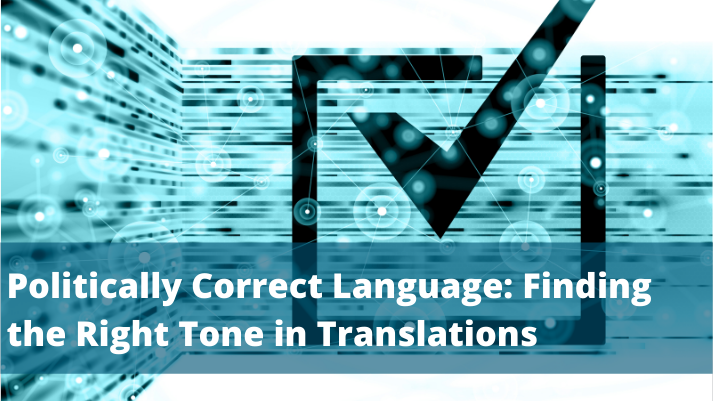Politically Correct Language: Finding the Right Tone in Translations
Why you should be mindful of inclusive language in international communication

Language is one of the most powerful tools available to us as humans. It’s capable of uniting and dividing us – of healing wounds, but causing them, as well. In Germany, the subject of non-discriminatory expression is currently dominating public discourse. Our home country isn’t the only place where people are taking a closer look at the ways in which language is used, either. For years now, the English-speaking world has been trending toward modes of expression that prioritize inclusivity and political correctness. Movements like Black Lives Matter have given further momentum to this development.
Companies with international business connections can’t ignore social and linguistic shifts like these. The right choice of words can make the difference between success and failure in negotiations, deals, marketing campaigns, and relationships with customers.
What is politically correct language?
Political correctness (sometimes shortened to “PC”) can be traced back to the 1980s, when U.S. students who were denouncing racism, colonialism, and sexism in teaching, research, and language swelled into a movement.
This debate gradually permeated the general public, where it eventually resulted in calls for more “sensitive” terminology in everyday expressions. This meant avoiding the use of prejudicial or offensive words and figures of speech and being inclusive with regard to minorities.
The anti-racist, non-discriminatory, and gender-sensitive vocabulary that emerged is often referred to as inclusive language.
Finding replacements for racially charged terms
More and more companies are making an effort to use politically correct language in both their external and internal communication.
There’s plenty of room for improvement in this regard, especially in IT and technical documentation. The standard vocabulary used in these fields contains a number of qualitative terms with racist undertones, such as “whitelist”, “blacklist”, and various compound words that include “master” or “slave” (“master language”, “slave report”).
According to leading software corporations like Microsoft and SAP, this needs to change. The former has declared its commitment to using non-discriminatory speech both within and outside its organization. To that end, it has also established a working group dedicated to the topic of inclusive language.
SAP, meanwhile, has resolved to replace words that have racist connotations with non-prejudicial terminology For example, the terms “leading” or “source” are to be used instead of “master” depending on the context. Rather than “slave”, words like “subsequent” or “replica” are appropriate ways to describe subordinate entities. “Blacklists” are now “blocklists”, “exclude lists”, or “avoid lists”, and “whitelists” have given way to “allow lists”, “include lists”, and “prefer lists”.
Racist undertones rear their ugly head in other areas, as well. In the U.S., real estate agents and architecture firms have therefore begun using the term “primary bedroom” of late instead of “master bedroom”. People are now even taking a dim view of “scrum master”, as well, which is a relatively modern job title in agile project management.
Raising awareness of discriminatory language
The movement toward inclusive language reflects society’s greater awareness of certain subjects, from racism and ableism to the debate surrounding gender. Here, speech is considered non-discriminatory when it avoids the use of stereotypes and addresses everyone equally, regardless of the following:
- Gender
- Sexual orientation
- Ethnic, national, or religious affiliation
- Social status
- Age
- Disability
Even when it isn’t the speaker’s intention, many common phrases can offend specific groups of people. What’s more, non-native speakers often lack the cultural background knowledge required to perceive the nuances in play. After all, it isn’t always obvious how language can be discriminatory.
It’s not uncommon for news outlets in the U.S. to describe an economy as “crippled”, for example. This word may seem derogatory to people with disabilities, however, so it’s a good idea to avoid using it in figurative ways like these.
The same applies to terms like “addict” and “OCD” (obsessive-compulsive disorder). Many people make casual use of these words in referring to excessive habits, but doing so trivializes serious illnesses.
Words with violent connotations such as “abort”, “execute”, “terminate”, and “kill” can also evoke negative associations and should be avoided in favor of less emotionally charged terms whenever possible.
Be mindful of non-discriminatory language in translations into English
No one wants to come across as offensive or disrespectful, and that’s why finding the right means of expression for your target audience is crucial – especially in international communication.
Luckily, there are a number of guidelines you can follow to make sure you don’t embarrass yourself inadvertently in your English texts. There are various pitfalls you should generally avoid in politically correct language, for example::
- Pronouns, titles, and other terms that are exclusively male (“chairperson” is more inclusive than “chairman”)
- Defining people by certain attributes (“a person with a disability” rather than “a disabled person”)
- Assumptions regarding gender/sexual orientation (“partner” instead of “boyfriend”/“girlfriend”)
- Generalizations of ethnicity (“Japanese” or “Chinese” rather than simply “Asian”, for instance)
You should also be sure not to describe people in terms that paint entire groups with the same brush or could be viewed as disparaging.
Leave nothing to chance – go with the experts
Politically correct communication requires a feel for the subtleties of the language at hand. Using inclusive language is an ongoing process in which constant adjustments may be necessary. This is why it’s important to bring in experts who are familiar with the modern and historical evolution of your target language.
At Lexsys, we work with native speakers who can translate your technical documentation, internal and external communications, and various other texts into English with a keen awareness of finer aspects that might put off the groups you want to address.
If having English content that’s inclusive and politically correct is important to you, contact us today.

Hello lexsys.de owner, Your posts are always well-written and easy to understand.